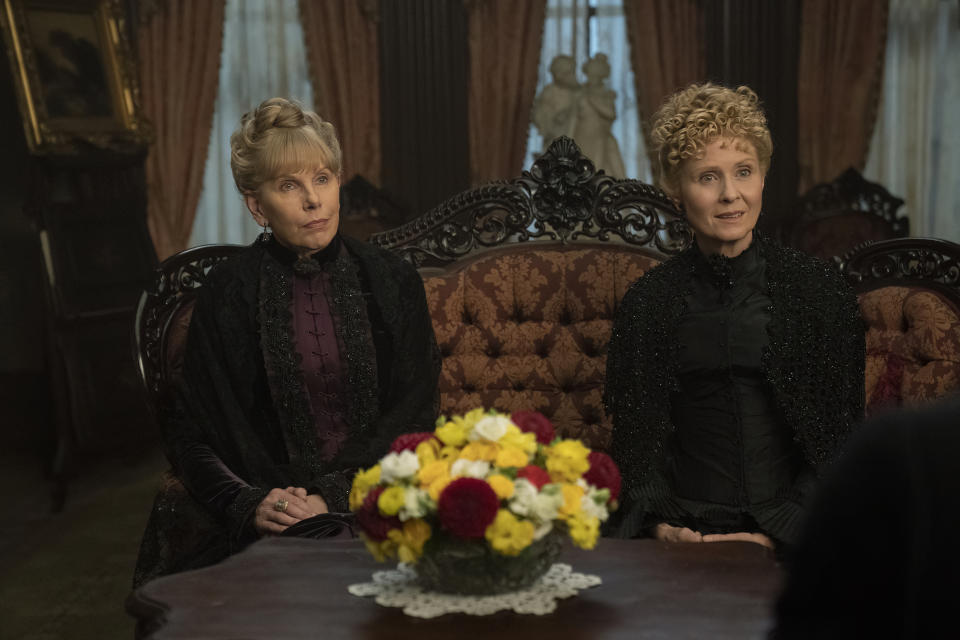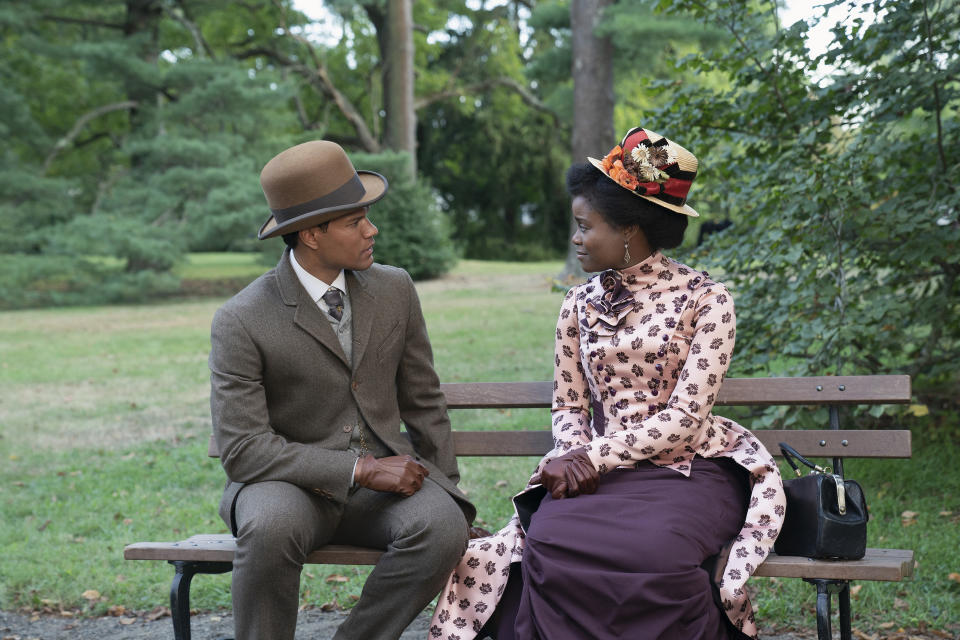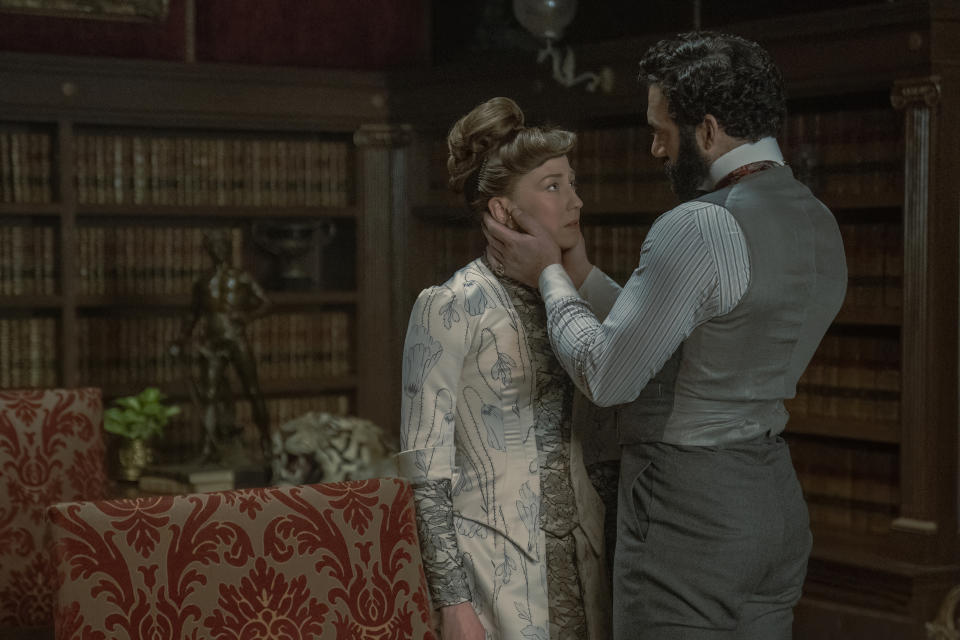Stuff *Finally* Happened in ‘Gilded Age’ S2 Finale: What Worked and What Didn’t

- Oops!Something went wrong.Please try again later.
When it comes to TV, how comforting is too comforting? At what point do the vibes outweigh the plot? These are the brave questions perhaps not asked but definitely raised by Julian Fellowes’ “The Gilded Age,” which finished its second season on Sunday, December 17. In a review of the full season, IndieWire’s Ben Travers compared the show to “a light drizzle,” saying that “The absence of actual conflict — problems that require more than a polite request to sort out — is so pronounced it threatens to undermine the serene parade of beautiful gowns by boring the pants off of those wearing them.”
And while Mr. Travers has new problems to deal with, “The Gilded Age” did gain a modicum of momentum in its back half and especially its finale, even if the actual plot developments were predictable (and not just from historical accuracy). There is potential here, whether it’s for a more consistent slow-burn of story or for the fits and starts of Fellowes’ “Downton Abbey,” in which hours of dinner prep are interspersed with a subplot to murder the king.
More from IndieWire
So where does the finale leave things with respect to Season 3? Here are some of the key events of Episode 8 with a break down of what they mean, what worked, and what didn’t.
The Loss of the Van Rhijn Fortune

This catastrophe ultimately amounts to almost nothing (almost — but we’ll get there), but it does deliver some of Christine Baranski’s best scenes of the season. Furious with her son and horrified that she’ll lose what remains of her status, Agnes shouts at him with the quivering command of a matriarch unmoored, a performance that had me raising my glass (water) and saying “Emmy” to my empty apartment. Will Oscar face any consequences, whether it’s rumors or diminished favor in his social circle? Probably not; he is a man.
Sound the Alarm
Can you believe we spent an entire season on the B story of Jack (Ben Ahlers) inventing the alarm clock? Neither can I — but he did it! Larry’s interest and Jack’s colleagues’ support is actually very sweet, but I cannot believe this thread is continuing into Season 3.
The Fight for Brooklyn Schools
After Peggy’s article about solidarity between Black and Irish families in the neighborhood, the school board shuts them out of meeting whose main purpose is to vote on keeping those schools open. Arthur (John Douglas Thompson) finds out in the nick of time and rallies the Black parents to head straight to the meeting, where they confront the school board for trying to blindside them and present their arguments.
As important as the school board story is, the minor victory leads to a couple of key character moments. Arthur moves up in the eyes of his wife and daughter — a sharp contrast to the Season 1 finale, in which they left and seemed they would never reconcile with him. One of the best parts of Season 2 was expanding and getting to know the Scotts’ community, and this development could balance out the duller prospects of Season 3 (what I’m saying is: more Melanie Nicholls-King!).
Also, Arthur’s discovery of the meeting leads to one of the best line reads of the episode:
“[The article] seems to have ruffled some feathers.”
“Yes, and your information has ruffled mine.”
Peggy Calls it Quits

After a loaded glance at the school board meeting, followed by a slightly awkward interaction afterward, Peggy meets with T. Thomas Fortune (Sullivan Jones) to tell him she can’t keep working at the newspaper because of their history. Kudos to Peggy for making a difficult and adult decision, and to the show for not drawing out her awkward work situation any longer. But you know who might need a little help making smart decisions for herself and letting men down lightly…
Marian Doesn’t Get Married (Again)
There’s a lot to say about “The Gilded Age” and its problem with romance, but watching Marian (Louisa Jacobson) wander listlessly from suitor-to-suitor is one of the show’s duller aspects. The Season 2 finale sees her break off her engagement to cousin Dashiell Montgomery (David Furr) — the second consecutive finale in which Marian or her family expected her to marry someone and she didn’t. The reason for both pivots is of course the show’s obvious but befuddling endgame plan of uniting Marian and Larry Russell (Harry Richardson), who elicit a “huh” of recognition from me every time they share a scene because I forgot the characters even know each other.
But know each other they do — and how! After the swiftly forgotten dalliance with a widowed woman in Newport, Larry is single and ready to mingle, sharing a spontaneous and dare I say contrived kiss outside the Van Rhijn home.
Bertha Wins the Opera War…and the Duke

One need only have Googled the real-life events and figures behind “The Gilded Age” to fast forward and find out who wins the opera war, but there is no Carrie Coon in that process. In her hands, it’s impossible to imagine the indomitable Bertha Russell giving up on or losing anything, least of all the most important social battle of her life. However, it is deeply satisfying as a viewer to see that packed house, every member of which stands and applauds when the Duke (Ben Lamb) enters (half of them can’t even see him! They’re clapping to fit in!). Mamie Fish (Ashlie Atkinson) is even so kind as to explicitly state for the audience that New York society has been restructured, with Bertha at the center.
And after a whole episode of repeatedly rolling her eyes (both literally and figuratively) at Gladys’s (Taissa Farmiga) new crush, Bertha once again forbids him coming over to their box during the show and pointedly directs her daughter to entertain the Duke. It’s only then, with the nail firmly hammered on its head right in front of him, that George starts to realize his wife may have offered her daughter’s hand in exchange for her Met victory — and that he’ll soon have to make good on the promise he made just a few episodes ago: to support Gladys marrying whomever she chooses, no matter what the cost.
Aida to the Rescue
Why did the Reverend Forte (Robert Sean Leonard) burst into our characters’ lives only to die in Episode 7? Why did Oscar lose his family’s fortune? So that Forte’s fortune could bail out the Van Rhijn and Brooke family. As Marian so aptly puts it: “Doesn’t this mean we won’t have to sell the house, the servants won’t lose their jobs, and nothing needs to change?” Truly yes! We simply must laugh.
However, the return to equilibrium does contain one exciting shift: since the money comes from Aida as Forte’s sole heir, she’s now equally if not more in charge than Agnes. “Things may be a little different in the future, Agnes,” Aida says with an apologetic smile that barely makes it to the end of the sentence. “But I’m sure we’ll work it out.
“The Gilded Age” is streaming on Max.
Best of IndieWire
Where to Watch This Week's New Movies, Including 'Wonka' and 'The Zone of Interest'
2023 Movies Shot on Film: From 'Oppenheimer' to 'Killers of the Flower Moon' and 'Maestro'
Quentin Tarantino's Favorite Movies: 59 Films the Director Wants You to See
Sign up for Indiewire's Newsletter. For the latest news, follow us on Facebook, Twitter, and Instagram.

